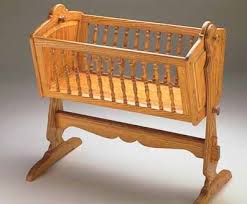cradle
英 [ˈkreɪ.dəl]
美 [ˈkreɪ.dəl]
- n. 摇篮;发源地;发祥地;支船架
- vt. 抚育;把...搁在支架上;把...放在摇篮内
使用频率:

记忆方法
将“cradle”与“摇篮”这一熟悉物体相联系。想象一个摇篮轻柔地摇晃,就像“cradle”这个词,表示承载、支持或轻轻放置在某物之中,这样可以帮助记忆其含义。
以上内容由AI生成, 仅供参考和借鉴
中文词源
cradle 摇篮
来自PIE*sker, 弯,转,编织,词源同ring, crib.
英语词源
- cradle (n.)
- "baby's bed," c. 1200, cradel, from Old English cradol "little bed, cot," from Proto-Germanic *kradulaz "basket" (cognates: Old High German kratto, krezzo "basket," German Krätze "basket carried on the back"). From late 14c. as "device for holding or hoisting." Cat's cradle is so called from 1768. Cradle-snatching "amorous pursuit of younger person" is from 1906.
"It's like cradle-snatching to want to marry a girl of sixteen, and you ought to be ashamed of yourself, for you can't be much more than twenty one yourself." ["Edith Van Dyne" (L. Frank Baum), "Aunt Jane's Nieces Abroad," 1906]
- cradle (v.)
- c. 1500, from cradle (n.). Related: Cradled; cradling.
权威例句
- 1. Mali is the cradle of some of Africa's richest civilizations.
- 马里是非洲一些最悠久的文明的发祥地。
- 2. I dropped the receiver back in the cradle.
- 我把听筒放回听筒架上。
- 3. He fixed the towing cradle round the hull.
- 他把牵引支架固定在船体上。
- 4. She rocked the baby to sleep in its cradle.
- 她摇动摇篮哄婴儿入睡。
- 5. a cradle swathed in draperies and blue ribbon
- 扎着打褶装饰织物和蓝色缎带的摇篮